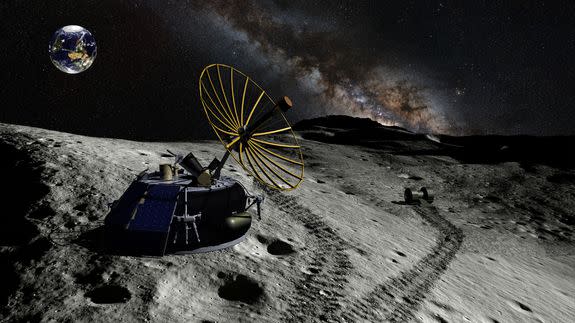A private spaceflight company just got approval to land a spacecraft on the moon

For the first time, the U.S. government just gave a private spaceflight company the equivalent of a passport to the moon.
Moon Express, a little-known spaceflight company, announced the federal approval on Wednesday morning. The Federal Aviation Administration (FAA) confirmed the move in a statement.
The company is aiming to send a robotic lander to the moon by the end of 2017, and while it still needs to manufacture and test its spacecraft, not to mention launch it to the moon aboard a yet-to-be-flown rocket, it now has regulatory approval from the federal government to eventually do exactly that.
SEE ALSO: Space is the next wild west for companies aiming for the moon and beyond
The company's decision to navigate the complex web of federal approval for such a space exploration mission before completing the design and build of its technology reflects the fact that bureaucratic complications rank high on the list of uncertainties for private spaceflight companies such as this one.
Better-known space firms, such as SpaceX, have also had to gain regulatory approval for their activities, though none has yet attempted to send a spacecraft to the moon or beyond.
A number of government agencies including the State Department, NASA and the FAA signed off on Moon Express's plan to fly to the moon after the company requested the government's approval earlier this year.
"There is no existing regulatory framework for private missions beyond Earth orbit, which is the fundamental reason why Moon Express created a proposed framework out of necessity to fill the regulatory gap for its 2017 lunar mission," Moon Express CEO Bob Richards told Mashable in an email.
Many hurdles to overcome

Image: moon express
Of course, before Richards and his company set sail, there is a lot more to accomplish besides getting permission.
Moon Express still needs to build and test its spacecraft designed to land on the moon and perform a series of tasks to win the $30 million Google Lunar X-Prize competition, which is designed to bolster the burgeoning industry.
The company is also hoping to hitch a ride aboard a Rocket Lab Electron, a type of rocket that has yet to even perform a test flight. (In other words, that 2017 date may slip a bit.)
It may seem odd that a company is developing a regulatory framework for something that isn't even possible yet, but with this regulatory box checked, at least Moon Express won't come up against some unforeseen last-minute bureaucratic issue that will keep it on the ground.
"We have solved the regulatory barrier that was preventing us from launching to the Moon in 2017, so we're back to focusing on the challenges we can solve ourselves: building the Moon Express spacecraft and business," Richards said.
And this ruling is somewhat unprecedented.
"Our 2017 Mission Approval is a critical achievement for Moon Express, as there was no possibility of us conducting a mission without it," Richards said. "It's also a landmark decision by the U.S government supporting commercial space sector, representing a pathfinder for private sector commercial missions beyond the Earth’s orbit."
One size fits all?
The regulatory framework that is taking shape from the government's Moon Express ruling could lead to more companies flying to destinations beyond Earth's orbit under this kind of regulation.
At the moment, private companies are mostly relegated to launching their spacecraft to Earth's orbit and not much farther. For every launch, private companies need to jump through a series of regulatory hurdles associated with a payload review conduced by the FAA.
This is designed to make sure that the spacecraft and launch vehicles are safe for use and that the mission doesn't violate any international space treaties.
Until now, no private company had been approved to fly its spacecraft outside of Earth's orbit. And a lot of companies are aiming for the moon and even beyond.
Other companies are also competing for the $30 million X-Prize, and still others — like SpaceX — are aiming for Mars.
In theory, these companies should now be able to use the approval process developed by Moon Express — or something similar — in order to fly their wares to the moon and beyond.
However, the FAA statement does caution that, while the Moon Express payload review did come out in the company's favor, this does not guarantee that all "non-traditional space missions" will be approved.
The inter-agency approval process for Moon Express focused on the safety of the craft as well as making sure that the mission is in line with the United Nation's Outer Space Treaty, which states that nations cannot claim land as their own on a cosmic body like the moon.
That treaty also specifies that countries must supervise the space activities of their companies that are flying to orbit and beyond.
John Logsdon, professor emeritus of political science and international affairs at George Washington University, said the Moon Express approval likely marks a major step forward for the private space industry.
"If an extraterrestrial economy does develop in coming decades and centuries, this action may be looked upon as an initial step in opening the trail to the future," Logsdon, professor emeritus of political science and international affairs at George Washington University, told Mashable via email.
"But the rather convoluted process of granting this license also suggests the need for rationalizing the government approach to facilitating private space exploration. Lots of work still to do."

 Yahoo News
Yahoo News